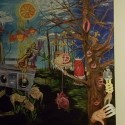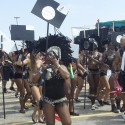Black Mothers and the Challenge of Motherhood
By Bolaji Williams
A few weeks ago the online world was treated to yet another saga in the ongoing, media-fabricated “Mommy Wars.” The story that raised the ire and indignation from the blogosphere and from mothers ‘everywhere’ was the unfortunately titled Wall Street Journal excerpt “Why Chinese Mothers Are Superior” from Yale law professor Amy Chua’s memoir, Battle Hymn Of The Tiger Mom. [Note Chua’s clever use of the war metaphor].
In her missive, Chua extolled the virtues of an extreme-parenting diet for her two daughters, which she claimed would net overachieving offspring, academic excellence and musical prowess. Chua’s recipe of no play dates, no sleepovers, endless hours of homework, a selection of two musical instruments with draconian practicing rules, no TV, no computer games, no school theatre, plus an attitude that it’s a child’s job to meet and surpass their parents’ expectations outraged many. At one point, Chua proudly proclaimed that she often called her girls names like garbage, because get this, this is how she grew up.
As you can well imagine, the backlash was swift and vocal. And although some of the subtleties, and dare I say irony of Chua’s book were lost on a “Western” frame of mind—she casually mocks the “over” focus on self-esteem— it certainly calls into question what we as Black mothers may or may not do.
My two sisters and I were raised by our Black mother in a single parent household in Winnipeg, Manitoba. My mother, a Jamaican woman, also raised by a single mother who had a keen interest in the arts, was given all but two career choices growing up: to become a nurse or a teacher. She chose the former. My mother married my father, a Nigerian man, whose father was a well-respected tribal chief and whose mother was a medicine woman. My father had a PhD in microbiology and virology at a time when due to a quota system he was not allowed to become a medical doctor. Being confined to these choices my parents never stopped encouraging us to achieve or to become what we wanted. In fact the “twice as good” philosophy was referenced, inferred and imparted to us in myriad ways.
Growing up we, too, had restrictions placed on us. In hindsight, I’d like to think that it was because my mother was dead-set against her three girls becoming a single parent “statistic”— you know the one, in which it is suggested that girls raised by one parent are prone to promiscuity and addiction; what I know now is that my fierce Jamaican mother simply marched to the beat of her own drum. And it didn’t matter to her what anybody thought of what she did or didn’t do; that class and race would not restrict her movements. Whatever society thought of us was immaterial as far as she was concerned. What we thought of ourselves, and what she thought of us was more important.
My Jamaican mother did not allow us to sleepover, or share clothes with our friends; we were not allowed to eat over at friend’s homes or spend copious amounts of time in front of our no-cable five-station television. We had music lessons and extra-curricular activities that our mother shuttled us to and from, and we had to attend church every Sunday without fail, even when my Mother was working. My mother was a big fan of newspaper advice columnist Ann Landers and she would often clip articles that she felt resonated with her parenting philosophies and place them on the fridge for us to see. Whenever we would repeat the familiar refrain, “well so and so is doing it” she would flash us a telling grin and say, “If all of your friends jumped off the Empire State building, would you do that too?”
When I was going through a rebellious phase that included talking back and nothing more serious, she took me and my sisters to family counselling, and practiced tough love. We were not allowed to frequent downtown, wear revealing clothing, or hang out in malls. If we passed our curfew, we would be unceremoniously locked out of the house and required to explain the following morning. I had my bedroom door removed from its hinges when I slammed my door one too many times, and if it wasn’t a spoon that had paddled my bottom, the odd shoe was thrown in my general direction.
But it wasn’t so much that my mother didn’t allow us to do anything. Rather, it was what she did allow us to do that fostered the creative spirit in each of us that would later drive acquaintances and strangers to suggest that we weren’t “Black” enough. For example, my mother was incredibly resourceful, and on her nurse’s salary, we would often take turns to explore the city’s rich cultural offerings. We frequented the world class Royal Winnipeg Ballet, The Manitoba Theatre Centre, The Winnipeg Symphony Orchestra and the outdoor theatre, Rainbow Stage. There was no question that we wouldn’t attend these seasonal events, it was how often. When it came time to choose university, the question wasn’t where to go, but when.
As a mother, when I look back on the choices my mother made given the set of circumstances she was faced with, I applaud her every move. I don’t lament what “could have been,” or what I perceive “should have been” because I think that whatever happened was likely what was meant to be. In recent years my sisters, now mothers themselves, and I have discussed the educational opportunities that we might have missed due to the fact that we didn’t live with our father. There was talk of Ivy League schools and different career paths, but we don’t dwell on that since it’s not based in reality. What we do have is a sense that we have the opportunity to own our decisions, to make the best life we can for ourselves and our children regardless of popular opinion or current fashion.
I think this is what Amy Chua has done, and certainly what I as a “Black mother” have done. What about you?








[...] This post was mentioned on Twitter by Nadine Williams, SWAY Magazine. SWAY Magazine said: Black Mothers And The Challenge of Motherhood | Sway Magazine http://t.co/bd2ut4O [...]
Leave your response!